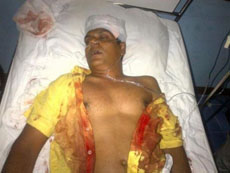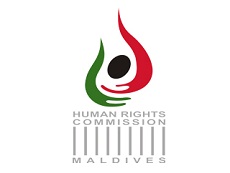The father of Hussain Humam, the main suspect in the murder of MP and religious scholar Dr Afrasheem Ali, has alleged his son was psychologically traumatised and under coercion by the police when he confessed to the crime.
The suspect has since retracted the confession he gave at a hearing held June 1.
In two separate letters dated May 26 that were sent to Criminal Court Chief Judge Abdulla Mohamed and the Human Rights Commission of the Maldives (HRCM), Humam’s father Ahmed Khaleel asks for assistance from authorities to “ensure [my] son is granted a fair trial devoid of coercion and undue influence.”
Referring to the May 22 hearing of the case, the letter sent to the Criminal Court and obtained by Minivan News reads: “I observed that when my son, Hussain Humam, was brought to the hearing, he was under psychological fear. I observed that he was in a very bad condition, was physically weak and his eyes were reddened. And during the trial, my son, Hussain Humam Ahmed, displayed signs of mental instability, including staring upwards, placing his handcuffs against his mouth, and laughing. Owing to these circumstances, I believe it is of utmost importance to assess Humam’s mental status prior to scheduling another hearing.”
During the previous hearing Judge Abdulla Didi denied a request by Humam’s lawyer that his client be psychologically tested, stating the lawyer had not mentioned any psychological disorder during a prior hearing to extend Humam’s detention.
Alleged police intimidation during trial
Khaleel also alleged in the letter that during the May 22 hearing, police acted “outside of the norms of a court hearing: attempting to psychologically intimidate Humam, and acting in many ways to influence what Humam had to say.”
Khaleel alleges that police forced Humam into initially rejecting his right to have a defence lawyer, stating, “When the Judge enquired if he wished to have a lawyer, Humam quietly said ‘I do want a lawyer too’, at which point the police officer on his right, and the two officers on his left – Ali Ismail and Shamin – gave angry looks towards Humam and gestured with their eyes in a way that seemed to indicate that Humam was not permitted to say so. I believe that this forced my son to give up and lose this constitutional right.”
“The police also continued to converse with each other while the hearing was ongoing, discussing different aspects of the case itself, and speaking in such a way that it seemed Humam was being threatened. They also exchanged written documents with the state prosecutor outside of court proceedings,” his father alleged.
“Despite the judge unfailingly working to carry out a trial based on fairness and equality where the rights of both concerned parties are protected, with reference to the actions of police in and out of the courtroom, I do not accept that the hearing in question was a fair and just hearing,” Khaleel wrote.
Khaleel called on the court to review video footage of the hearing to confirm his claims, and pleaded for his son to be granted a fair trial and the constitutional rights entitled him.
CP Riyaz and other senior police officials accused of coercion
Khaleel alleged in his letter that in every instance he had visited Humam, his son had repeatedly complained that the police were trying to force him to confess to the MP’s murder.
“I have also observed that the police have phrased their words in such a manner that forces [Humam] to confess. For instance, police brought Humam to Male’ as a hearing had been scheduled for May 16. However, your court cancelled the hearing in the end, and instead of taking Humam back to the Villingili Police Station (where he is being held in detention), he was kept in police headquarters in Male’,” Khaleel wrote.
 “I have learnt that while he was being kept in Male’, several police officers of various senior ranks questioned him, outside the processes of investigation, including Commissioner of Police Abdulla Riyaz. They all pushed him to confess, assuring him that he would be spared the death sentence if he did so, and threatening that if he did not, they would ensure that he was sentenced to death. Police further said that if he chose to confess, he would be spared from both the death sentences and charges previously raised against him, and tried to confuse and delude him,” he alleged.
“I have learnt that while he was being kept in Male’, several police officers of various senior ranks questioned him, outside the processes of investigation, including Commissioner of Police Abdulla Riyaz. They all pushed him to confess, assuring him that he would be spared the death sentence if he did so, and threatening that if he did not, they would ensure that he was sentenced to death. Police further said that if he chose to confess, he would be spared from both the death sentences and charges previously raised against him, and tried to confuse and delude him,” he alleged.
“I have also learned that police, even in other instances, have tried to threaten and coerce Humam into a confession, and have asked him to make use of the opportunity presented.’”
“The confession was an exaggerated mix-up of disjointed statements”
“My wife – Humam’s mother – and I met Humam on May 23 and my wife asked him to tell the truth for her sake and the nine months and ten days she carried him inside her, and Humam cried out, ‘No, mother, I did not kill Afrasheem’. He said the same when I repeatedly questioned him about it,” Khaleel stated.
“Therefore, Humam having stated in front of both of us in the court hearing, in such a way that will be heard by the whole of the country, that he had killed Afrasheem, he then told us that he had, in fact, not committed the murder, and this gives rise to many questions in my mind about how this could have happened,” he continued.
“I am now certain that the police and various political leaders, in a bid to hide the truth behind this, and to conceal the real murderer, have made police question Humam and get details about his life and past. I am also certain that the statement that was submitted to the court as one provided by Humam, is in fact an exaggerated account mixing together responses Humam gave to police about unrelated matters, adding and taking out details, and changing and editing it to align with what the police want it to state,” Khaleel alleged.
“When police are exerting undue influence and interfering with a case under the jurisdiction of your court; forcing Hussain Humam to give up a constitutional right, concealing the actual culprits behind the murder for different political gains, telling Humam various things in a bid to pin this on innocent people, and senior police officers are pushing their long arms into this matter outside the boundaries of the trial, I would like to bring this matter to your attention,” he wrote in conclusion of his letter to the Criminal Court Chief Judge.
Speaking to Minivan News today, Khaleel confirmed that officials of the Criminal Court had met with him and advised him on the best way to proceed.
“They told me that some of the matters I had pointed out can only be raised through a lawyer. They were helpful and listened to my concerns,” Khaleel said.
Criminal Court Media Official Ahmed Mohamed Manik was not responding to calls at the time of press.
Police deny coercion allegations
“It is an outright lie. The hearing proceeded in the presence of the judge. Media was also present in the room. Police did not at all intimidate or threaten Humam in any way, nor did police attempt to influence the courts in any form,” stated a police media official, requesting to remain unnamed.
“We can say with certainty that at no time, during or after the investigation stages, did senior officials talk to Humam to pressure him into a certain action or to influence the trial,” the police spokesperson said.
“Confused how HRCM defines human rights”
 Khaleel also wrote to HRCM, expressing concern that his son was being subjected to psychological trauma, threats and intimidation while being held in police custody.
Khaleel also wrote to HRCM, expressing concern that his son was being subjected to psychological trauma, threats and intimidation while being held in police custody.
He further alleged that Humam was being coerced into confessing to a crime he did not commit, requesting the commission to look into the matter, and to grant an appointment in which he could provide further details of the allegations.
Khaleel further claimed that police had initially prevented Humam from seeking legal representation, thereby stripping him of the constitutional right stipulated in Article 16 of the Constitution of Maldives.
“I have not had any response from HRCM. I have been endlessly trying to get them to do something about this. I have called them lots of times, and they either say they’ll call back or that there’s no one relevant to talk to. Once, I was told there was no point in meeting the HRCM President just yet, that maybe I should meet someone else they recommend. My point is, how will I be able to meet anyone unless they grant me an appointment, at the least?” Khaleel told Minivan News.
“If they call themselves the Human Rights Commission, shouldn’t they be looking into matters like this where a citizen is being deprived of his rights? I am no longer sure how this commission defines human rights, or just how much they are able to protect such rights,” he said.
HRCM Media Official Sajidha Majdi confirmed that the commission had received the letter, but declined from commenting on the matter, stating it was against the commission’s policy to speak about an ongoing case.
Likes (0)Dislikes
(0)Dislikes (0)
(0) 
 “I have learnt that while he was being kept in Male’, several police officers of various senior ranks questioned him, outside the processes of investigation, including Commissioner of Police Abdulla Riyaz. They all pushed him to confess, assuring him that he would be spared the death sentence if he did so, and threatening that if he did not, they would ensure that he was sentenced to death. Police further said that if he chose to confess, he would be spared from both the death sentences and charges previously raised against him, and tried to confuse and delude him,” he alleged.
“I have learnt that while he was being kept in Male’, several police officers of various senior ranks questioned him, outside the processes of investigation, including Commissioner of Police Abdulla Riyaz. They all pushed him to confess, assuring him that he would be spared the death sentence if he did so, and threatening that if he did not, they would ensure that he was sentenced to death. Police further said that if he chose to confess, he would be spared from both the death sentences and charges previously raised against him, and tried to confuse and delude him,” he alleged. Khaleel also wrote to HRCM, expressing concern that his son was being subjected to psychological trauma, threats and intimidation while being held in police custody.
Khaleel also wrote to HRCM, expressing concern that his son was being subjected to psychological trauma, threats and intimidation while being held in police custody.
